11 Thoughts After Finally Watching 'The Muppets Take Manhattan'
38 years after the Muppets arrived in New York with dreams of stardom a 'Reveal' writer decided to see how they fared.
Last week, in a piece ranking the summer blockbusters of 1984, I listed several films I wasn’t including because I’d never seen them, including The Muppets Take Manhattan. Within minutes of the piece’s publication, I received my first shocked DM. How had I not seen The Muppets Take Manhattan? How?!?
As I noted then, I thought I had effectively seen it over the years thanks to catching bits and pieces on television. Turns out I was wrong. While I’d definitely seen a bit of The Muppets Take Manhattan, most of it was new to me. Here are a few thoughts after catching up with it and Jim Henson’s final — and I now realize best — film performances as Kermit 38 years after its release.
1. How did I miss this?
I might have gone to see more movies in the theater in the summer of 1984 than any other summer of my youth. But I gave this one a pass. Why? I loved the Muppets, after all. I grew up watching Sesame Street and graduated to The Muppet Show. I remember seeing The Muppet Movie and The Great Muppet Caper in the theater (and especially loving the latter). I was only eleven. Why did I skip it?
“Eleven” might be explanation enough. That year I liked mischievous gremlins and that scene in Temple of Doom where the bad guy gets crushed under the giant roller. Whether or not I should have, I’d moved on from the Muppets’ gentler charms. I’ve seen something similar with my own 11-year-old kid, who’s taken to turning up her nose at anything that reads as “kids stuff.” Recently, when I pointed out that Captain Underpants creator Dav Pilkey had a new book out she looked at me, embarrassed for both of us, and said, “I don’t really read Dav Pilkey anymore.” (She mostly reads fantasy novels about anthropomorphic cats these days, but I suspect that will change as well.)
2. Why did I never get around to it later?
If my enthusiasm for all things Muppet had reached a low ebb in 1984, it didn’t stay that way. Jim Henson’s 1990 death came as a shock, coinciding with my own burgeoning grown-up appreciation for Muppet wit and craftsmanship, and the realization that the Muppets just weren’t around much anymore. If I wanted to watch The Muppet Show, I couldn’t. Even the reruns were nowhere to be found. Something that was once culturally ubiquitous starting to fade away can double as a tiny but unmistakable reminder of your own mortality. (I can still remember the sinking feeling I had when I realized toy stores weren’t stocking Star Wars toys anymore in the back half of the 1980. Whither my childhood?)
Still, the Muppets hadn’t faded away entirely, and the movies were certainly easy to track down. I’m still not sure why I never bothered with this one.
3. Hey, this movie’s pretty good!
Now that I got around to it, I enjoyed this Muppet movie quite a bit. The plot, in which Kermit and co. have to put on a show, may play like a retreat to first Muppet principles — the series was always about putting on a show — but it worked for a reason. Here, as they try to make it in New York theater, it’s a set-up for all sorts of delightful moments: the Muppets living in bus station lockers, bears and frogs (and whatever Gonzo is) seeking out jobs to make ends meet, an exploration of the seedier side of Broadway, and some great use of New York locations. And while it’s never in doubt that the story is headed toward a happy ending, the film stirs some real pathos along the way.
4. Everyone makes it look easy
This is Frank Oz’s solo directing debut and — particularly after The Dark Crystal, which he co-directed with Henson— it looks like it was breezy fun to make, the work of a bunch of old collaborators getting together and (shades of the Muppets themselves) putting on a show. Apparently this was not the case at all, and how could it be, really, with a movie that involves filming Muppets on location and wrangling a bunch of star cameos in the process?
An interesting bit of trivia, according to Muppets writer David Misch: Dustin Hoffman was apparently supposed to play the producer modeled after Robert Evans but at the last moment backed out, afraid of offending Evans. This led to a cascade of drop-outs that included Steve Martin, Michael Jackson, Lily Tomlin, Richard Pryor, and Laurence Olivier. So the stars who do appear in the film are apparently second choices. That mostly tracks. With all respect to James Coco, Linda Lavin, and Brook Shields, none were A-listers in 1984. Still, even if everyone had to scramble to rework the movie to accommodate the new guests, The Muppets Take Manhattan makes inspired use of the stars it did land, particularly Joan Rivers (who shares a scene with Miss Piggy) and Liza Minnelli. I’m not sure anyone is having as much fun as Gregory Hines, however, who plays a Central Park roller skater who becomes deeply invested in Kermit and Piggy’s relationship.
5. This might be Jim Henson’s finest moment as Kermit the Frog
Henson was already trying to figure out what to do next, and his plans didn’t always involve the classic Muppet characters. Oz — who co-wrote the script with Tom Patchett and Jay Tarses, sitcom veterans who’d worked on The Great Muppet Caper — ended up shouldering a lot of the film’s creative duties. But however much Henson might have delegated — and delegating at all seems like it was always difficult for Henson — he gives his all in his performance as Kermit, who’s even more heartbreakingly vulnerable than usual. Especially inspired is the sequence late in the film that finds him working a dull advertising job alongside some gray-tinted frogs.
6. Same for the rats
It’s a pretty good showcase for the Muppet rats, too. Rizzo gets some fine moments, but I was really taken with the gentlemanly Masterson and the ailing Chester, both of whom make their debuts here.
7. The Muppet Babies are a nightmare
Just a nightmare! They appear in a gratuitous dream sequence and mewl and pout their way through a bunch of nonsense before thankfully disappearing. Here’s Misch again: “[I]t had no relevance to the plot and its purpose appeared for marketing. It was, of course, a huge success (as was the marketing).” And, indeed, it was thanks to a long-running animated spin-off featuring the characters (that was occasionally used to illustrate the teachings of L. Ron Hubbard).
8. Why didn’t we see more of Juliana Donald?
Donald, the Muppets’ main human co-star is super-charming as Jenny, a waitress/aspiring designer who helps make the Muppets’ Broadway dreams come true. She really sells the reality of the situation, always treating her puppet co-stars as if they were flesh-and-blood and not sticks and felt. Donald, later credited as Julie Donald, had a busy career ahead of her as an in-demand character actor, appearing on everything from Walker Texas Ranger to Melrose Place to The X-Files and in a long arc on NYPD Blue. She still pops up from time to time, but it’s kind of surprising she was never given another high-profile role after this movie. Star Trek fans know her for a couple of memorable guest spots, including one in which, shades of her ability to sell playing opposite a Muppet, she seductively fondles Quark’s prosthetic ears on Deep Space Nine. Maybe there just weren’t that many roles calling for her particular skill at dropping into the realities of unreal creations.
9. This is still how I think of New York
I may not have seen The Muppets Take Manhattan in 1984, but it still belongs to the period that defined New York for me as a kid in Ohio, one that stretches from the Macy’s Thanksgiving Day Parades of the early-‘80s through Martin Scorsese’s After Hours. When I go there I’m still kind of surprised it’s changed.
10. So are Kermit and Piggy married?
The Muppets Take Manhattan concludes with a wedding attended by seemingly every Muppet Henson and his crew ever created (including the Sesame Street gang). It takes place within the context of a play but is apparently legally binding, Piggy having brought in a real priest to perform the ceremony. So it’s a real wedding in the context of a fictional story. But it also takes place within a piece of fiction in which the Muppets are playing characters. So if Muppet Reality Prime is the reality of The Muppet Show (with The Muppet Movie serving as an origin story for that reality) then The Great Muppet Caper, The Muppets Take Manhattan and (I believe) the later movies all take place within a fictional creation within that universe. In which case, the answer is “no,” they are not really married. Right? I don’t know. The mind reels.
11. Do the Muppets have a future?
I may have rejected Kermit and the gang as an 11-year-old, but I could never get my own kid into the Muppets, even when she was younger. She watched a couple of episodes, but she’s been Muppets averse for as long as she could express a preference. None of her friends have ever been into the Muppets. (And The Simpsons were making jokes about kids not knowing what the Muppets were way back in 1996.) Attempts to reestablish the Muppets as movie and TV stars have met with mixed results, even with the might of Disney behind them. Honestly, I have mixed feelings about this. I thought both the theatrical movies were all right and rooted for the Muppets TV show to get better until it was canceled. But maybe some things aren’t meant to last forever. Do we need Kermit, Piggy, and the gang to have lives that go on and on and on? Maybe they belong to a particular time and place, one we can revisit whenever we like (or even belatedly visit for the first time decades later).




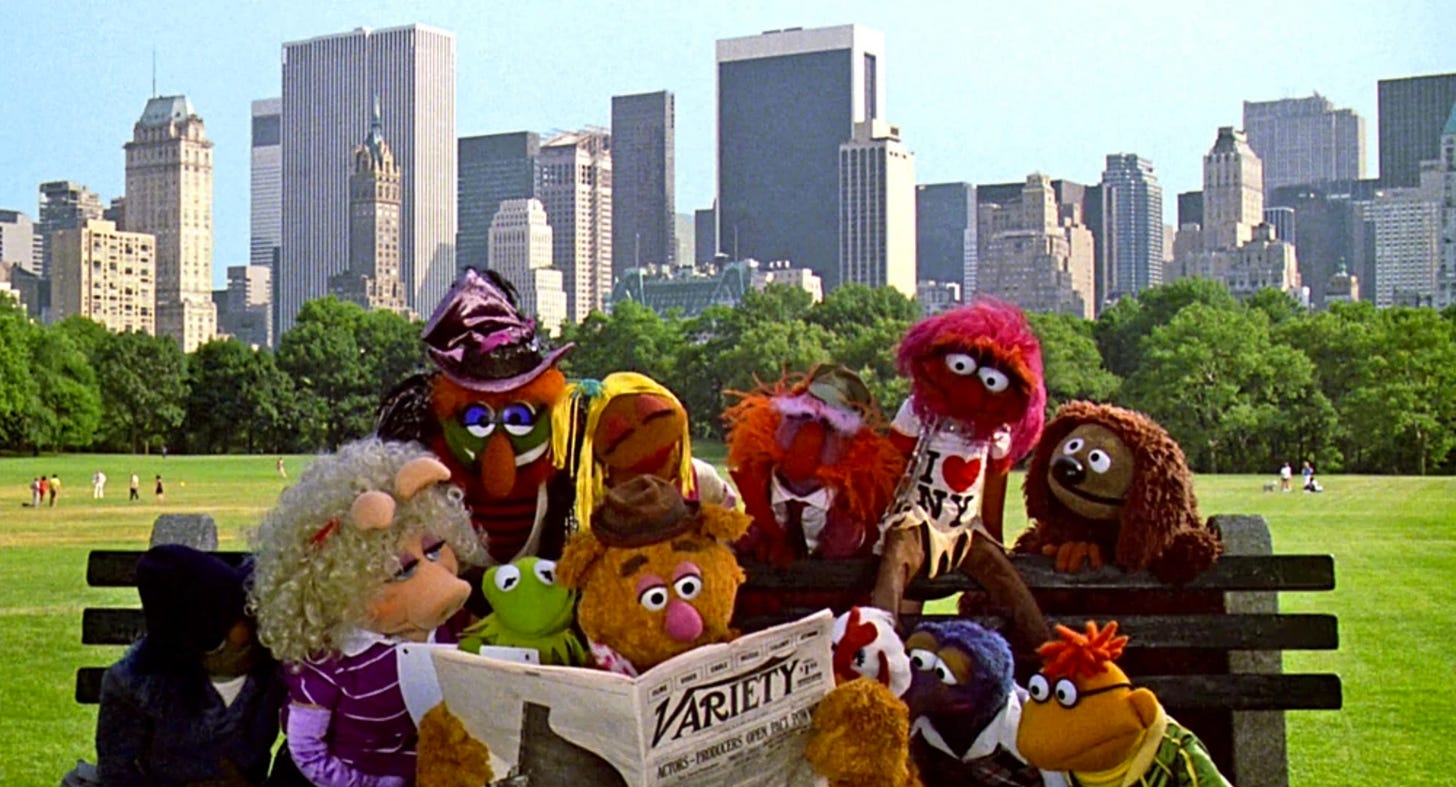

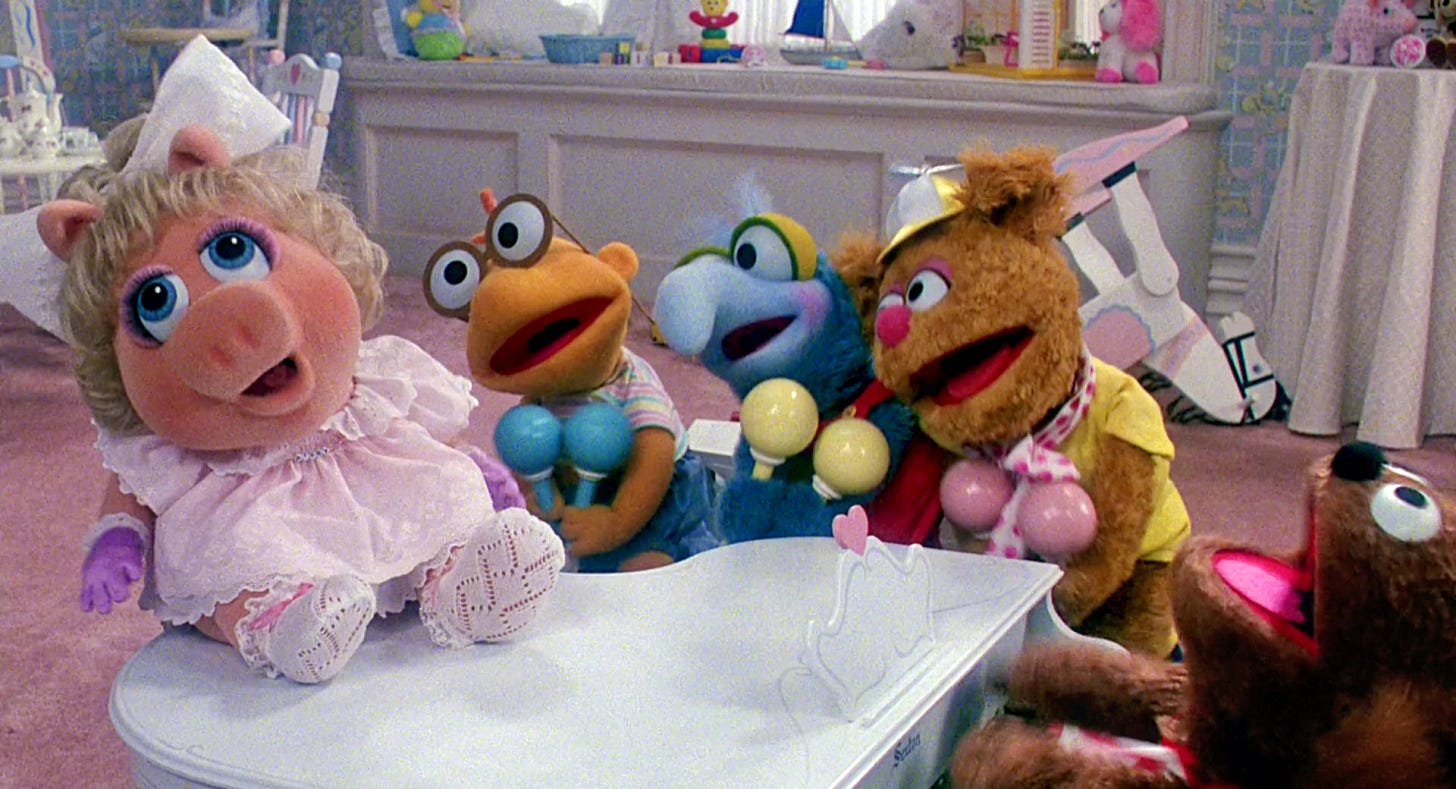
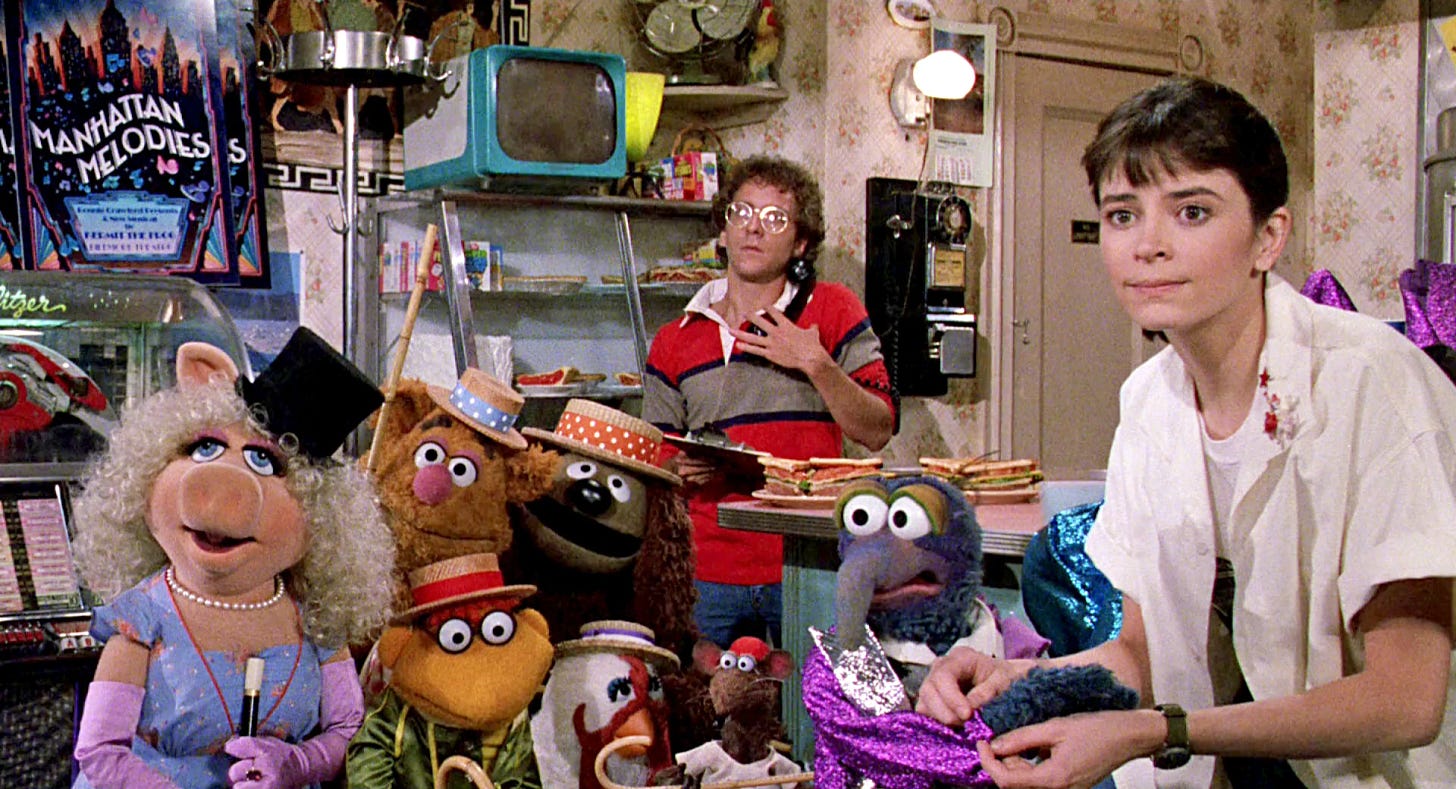
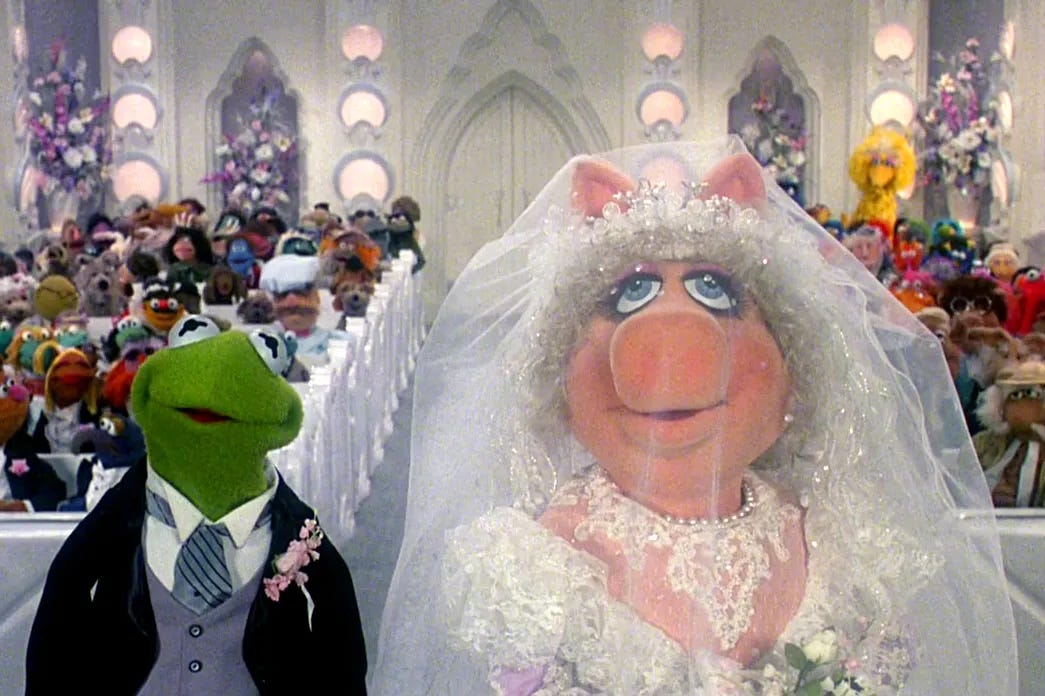
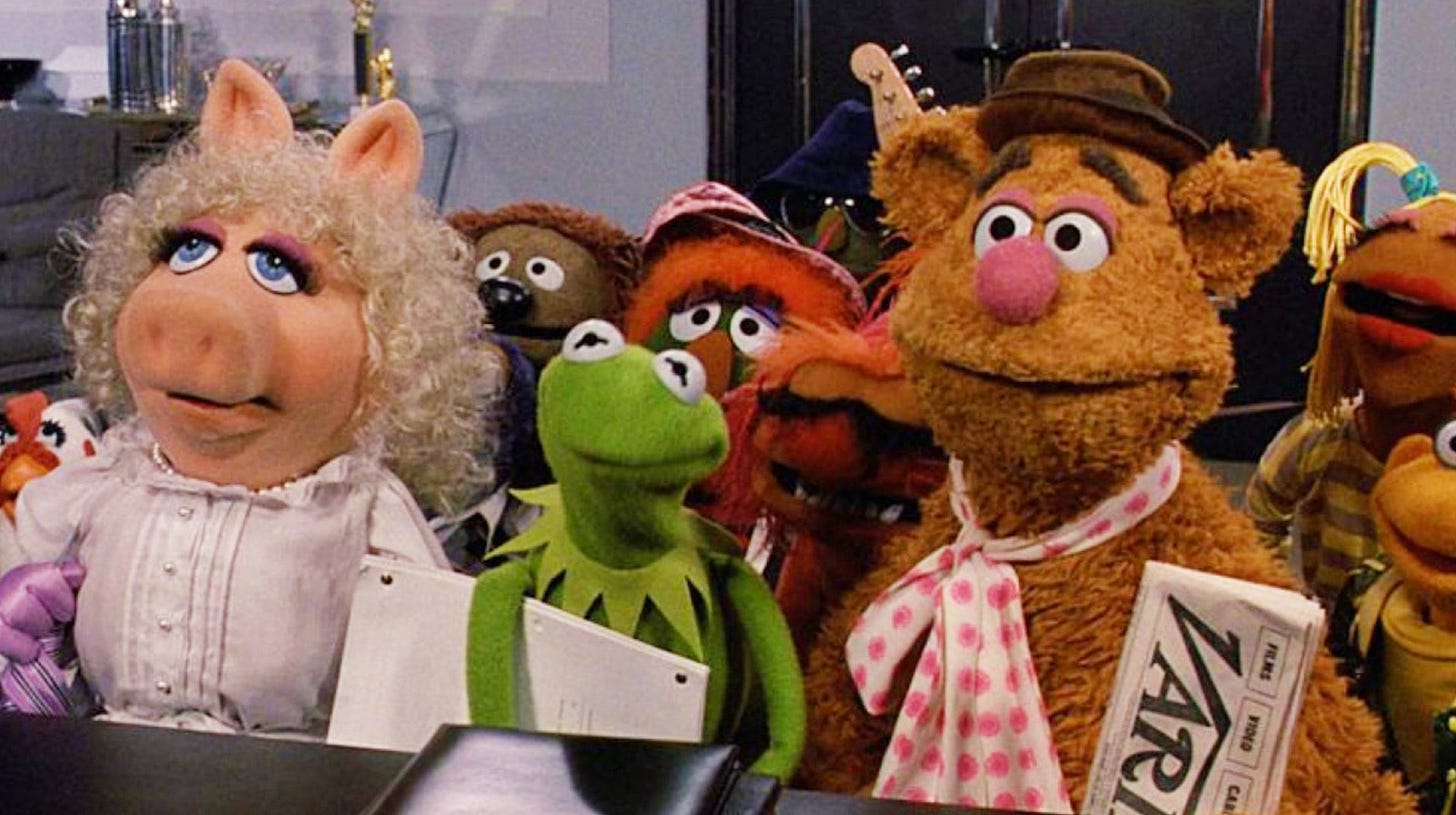
I have so much love for the frog-in-the-gray-flannel-suit sequence and the lesson that the answer when something's missing is *more* "frogs and dogs and bears and chickens and ... and whatever!"
I think I shared this story back in the day on the Dissolve, but given the occasion, I think it's only right to share it again. Of all the movies I saw before the age of, say, six, I think this movie possibly had the most lasting psychological impact on me as a kid. Not necessarily because of the movie itself, but because during the scene when Kermit is walking across the street and he gets hit by an NYC cab, my dad, in a flash of inspiration, decided that it would be hilarious if he turned off the movie and told me that was the end.
Oh sure, I cried and cried during the immediate aftermath (I think my mom made me watch Sesame Street later that day to "prove" that Kermit was still alive), but in retrospect, I am pretty sure this is the funniest thing that has ever happened to me.